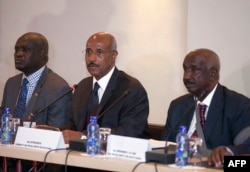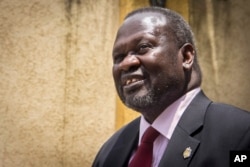Negotiators meeting in Addis Ababa have signed an agreement on the cessation of hostilities, protection of civilians and humanitarian access in South Sudan in an attempt to end the four years of conflict that has killed hundreds of thousands of civilians.
The High Level Revitalization Forum was led by the Intergovernmental Authority on Development (IGAD).
IGAD’s Special Envoy for South Sudan Ismail Wais said the agreement will come into force at 00:01am South Sudan local time on December 24.
"The milestone achieved during this week could not be possible without the constructive engagement, goodwill and support of the South Sudanese delegates," Wais said.
South Sudanese stakeholders, representatives of the government of South Sudan, opposition parties, armed and unarmed groups, civil society groups, eminent persons, business, women and youth have been meeting at the African Union headquarters in Addis Ababa since December 18 to revive the collapsed South Sudan 2015 peace deal.
African Union intervention
The head of the African Union (AU), Chairperson Moussa Faki Mohamed, caution the South Sudanese leaders to live up to the pledges they have made during the negotiations of a cease-fire agreement. Mohamed says the African continent and the East African region is interested in finding an end to the conflict in South Sudan.
"The real test of the seriousness of your commitment would reside in the practical actions that you would take to implement the terms of this agreement. Practical action to stop the fighting, offensive and counter offensive, that [has] killed so many innocent civilians, bereaved so many families and cause so much damage," Mohamed said.
The head of AU said the signing of the cessation of hostilities comes in the backdrop of continuous fighting across South Sudan.
Fighting erupted in July 2016 in the South Sudanese capital Juba, leading rebel leader and former first vice president Riek Machar to escape to the Democratic Republic of Congo and shattering the 2015 peace deal signed in Addis Ababa.
Even when implemented, this agreement is just one element in the struggle to find peace and sustainable solution to this conflict, Mohamed said.
Stern warning
Ethiopian Foreigner Minister Workneh Gebeyehu, who is also the chairman of the IGAD’s council of ministers, warned the South Sudanese to stop the fighting in their country.
"I must emphasize that we will continue to follow up and single out spoilers to be named and shamed and take action necessary [against them]," Gebeyehu warned.
The top Ethiopian diplomat assured the South Sudanese that his country will ensure that the efforts of IGAD’s seven member countries to bring peace in South Sudan are not undermined by individuals or the warring groups.
"To ensure your efforts in reaching this decision is not wasted, we cannot sit ideal while this important process is picking up. Along with you, we are saying enough is enough." Gebeyehu warned.
Peace monitor
The deputy chairman of the Joint Monitoring and Evaluation Commission (JMEC), Augostino Njoroge, applauded the various South Sudanese stakeholders for signing a cease-fire accord to create an environment for negotiations of the unimplemented parts of the 2015 peace.
“This is only the beginning of the High Level Revitalization Forum and we expect that the spirit in which this phase of the cession of hostilities has been concluded will continue. We in JMEC look forward to your return for further negotiations," the retired senior Kenyan army officer said.
The IGAD leaders decided to revive the shattered 2015 peace deal after JMEC documented several violations by both the government of South Sudan and rebels loyal to Riek Machar.
Some leaders of the armed opposition have criticized JMEC for biased reporting of violations of the peace agreement in July 2016.
IGAD Special Envoy reminded the parties who signed the cessation of hostiles to respect the terms of the agreement.
"Signing of a document is a very simple exercise. But let me make this appeal to all the parties to this agreement, please adhere to the commitment you have made here tonight to cease all [forms] of hostilities, [I] also urge your supporters to do the same," Wais pleaded.
The second phase of the High Level Privatization Forum will start in the second week of January 2018. The various parties are expected examine the 2015 deal to include other new groups who rebelled against President Kiir’s administration after the collapse of the August 2015 deal in the first week of July 2016.








